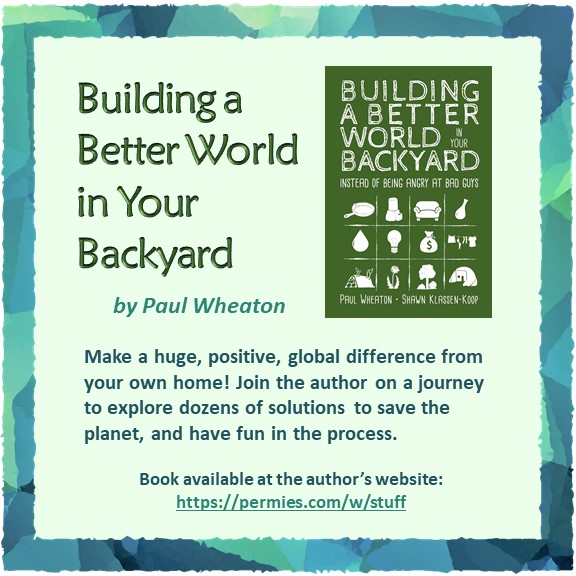From the Introduction:
“For nearly every global problem, there are solutions we can implement in our backyard that also save us money and help us live more luxuriant lives. A few of us do these things and bask in the glow of the opulence and extra cash. Others observe and think ‘I want extra luxury and money too! Not fair!’ and then they emulate. And on and on it goes. Then the global problems sorta just dry up and blow away. That’s what this book is all about.
“I think the reason we see so many people angry is because they authentically care. But they seem to get stuck at being angry. Some people spend a hundred hours a week for 20 years being angry and not much changes. But I think that if you spend a tiny fraction of that time doing the things mentioned in this book, your global positive impact will be a thousand times greater.”
Sherri Rosen: What is your book about?
Paul Wheaton: Recipes and philosophies for dramatically making a strong, personal, positive impact on the environment. So strong that if just ten percent of the population adopted half of the things in this book, that it would solve nearly all of our environmental problems. And all while making for a more luxuriant life and saving money. Without getting involved in politics or protesting. We thought about some really artsy titles, but, in the end, we decided that “Building a Better World in Your Backyard Instead of Being Angry at Bad Guys” is extremely direct.
Sherri: What does a better world look like to you? What problems does your book focus on solving?
Paul: We would love to have focused on all of the problems. But we didn’t have that much space in the book. So we decided to focus directly on three footprints: carbon footprint, petroleum footprint, and toxic footprint. It just so happens that by implementing the solutions we present for these three problems, we would also go a long way toward solving most of the world’s other problems too.
Sherri: Who is your book for?
Paul: We have discussed this a few times. It seems like each time, although it feels weird to say it, the answer is “everyone.” But maybe it’s especially for people who are passionate about solving world problems and feel like the usual “solutions” just don’t cut it. Or maybe they just like saving money. And a lot of our solutions are focused on people living in a cold climate, so maybe someone from a tropical climate would get less out of the book, but there are still parts that would apply for them.
Sherri: Why the focus on personal change rather than political change?
Paul: So often it feels like the solutions being presented for global problems are along the lines of “we need politicians to do so and so and if they don’t we’re going to be angry about it.” At the end of the day there is often very little progress, if any. In this book we place a strong focus on things that you can do, at home, that are guaranteed to make a significant positive difference – without writing letters, attending protests, or being angry at bad guys.
Sherri: What do you think will motivate people to implement the solutions you present in your book?
Paul: A lot of the time we hear about solutions that sound a lot like sacrifice: drive less, turn your heat down, take cold showers, etc. But in this book we place a strong emphasis on solutions that make a huge impact while also saving money and providing a more luxuriant life. The idea is that a lot of people might want to implement these solutions even if they aren’t particularly passionate about solving world problems. Maybe they just want a little extra money in their pocket.
Sherri: So many books say “if everyone did this, it would solve the problem.” What if only some people make these changes?
Paul: We strongly believe that if only a fraction of the population implements the ideas in this book, we will have effectively solved the problem. The few DO have the ability to solve the problems of the many.
Sherri: Can anyone do the stuff mentioned in your book?
Paul: A lot of books about solving world problems focus on the need for further innovation in order for their solutions to make an impact. While we both really appreciate and encourage further innovation, we also recognize that the average person might not fit under the label of “innovator.” So in our book we focus on solutions that the average person can implement NOW that make a huge difference while we are waiting for the innovators to come up with further optimizations.
Sherri: Your book is called “Building a Better World in Your Backyard.” What if people don’t have a backyard?
Paul: The book is broken down into six different parts: the introduction, the problems, general strategies, things you can do within the walls of your home, things you can do in a backyard, things you can do on a homestead, and the conclusion. The idea is that there is something in here for everyone. And maybe, in time, you will find a way to get access to more space to play with these ideas.
Sherri: Why now, vs 10 years ago or 10 years from now? Do you feel like change is attainable today? Is the population ready?
Paul: We wish this book would have been available 10 years ago. But it’s not. It’s available now. So we make the best of it. We are intentional about trying to provide incentive for people to implement the solutions in our book, not guilt them into it. I think that this makes a huge difference in whether or not people will be interested in making change.
Sherri: Are there examples of people implementing the solutions presented in this book, or is it all just theoretical?
Paul: This is a book about practical solutions. Some of these ideas are fairly new, but many of the ideas presented in this book have been implemented by thousands, maybe even millions, of people.
Sherri: What inspired you to write about building a better world?
Paul: We both have had far too many conversations about solving world problems where the other person was providing solutions that were very weak. And when we tried to bring up our solutions, they would tell us that those solutions couldn’t possibly solve the problems because otherwise they would already have heard about it everywhere. It would have “gone viral.” The hope is that, by sharing this book with the world, these ideas will infect the brains of millions of people and we can have a lot more progress.
Sherri: What chapter of the book took the longest to write? Why?
Paul: We have a chapter on growing double the food with one tenth of the effort. It wasn’t that we had trouble figuring out what to say, it’s that we had trouble figuring out what not to say. We spent many weeks trying to cram a massive amount of information into this one chapter. There’s so much more that we would like to say, but we think it turned out pretty great.







Read 0 comments and reply